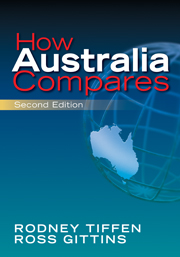Book contents
- Frontmatter
- Contents
- List of tables and figures
- Preface to the second edition
- Acknowledgements
- Reading the tables
- Abbreviations
- Introduction
- 1 People
- 2 Government and politics
- 3 Economics
- 4 Work and labour
- 5 Government taxes and spending
- 6 Health
- 7 Education
- 8 Inequality and social welfare
- 9 International relations
- 10 Environment
- 11 Science and technology
- 12 Telecommunications and computing
- 13 Media
- 14 Family
- 15 Lifestyles and consumption
- 16 Crime and social problems
- 17 The search for scoreboards
- 18 The Howard impact
- Sources and references
7 - Education
Published online by Cambridge University Press: 05 June 2012
- Frontmatter
- Contents
- List of tables and figures
- Preface to the second edition
- Acknowledgements
- Reading the tables
- Abbreviations
- Introduction
- 1 People
- 2 Government and politics
- 3 Economics
- 4 Work and labour
- 5 Government taxes and spending
- 6 Health
- 7 Education
- 8 Inequality and social welfare
- 9 International relations
- 10 Environment
- 11 Science and technology
- 12 Telecommunications and computing
- 13 Media
- 14 Family
- 15 Lifestyles and consumption
- 16 Crime and social problems
- 17 The search for scoreboards
- 18 The Howard impact
- Sources and references
Summary
Educational attainment
In a complex sophisticated economy, education is a key both to individual prospects and to national economic performance. Before World War II, in most countries, most people finished their schooling at junior secondary level or below. Now, as Table 7.1 shows, more than three-quarters of the adult population in these countries have completed at least upper secondary education, and many go on to complete other post-secondary and tertiary qualifications. Table 7.1 shows that Canada, Japan and the United States have the most qualified adult populations, while Austria and Italy are the only countries where fewer than one in five has tertiary qualifications. While Australia is close to the average on tertiary qualifications, it is below average on completion of upper secondary schooling.
Each educational system grew up with its own assumptions and methods. However, international bodies have devoted considerable attention to standardising the types of institutions and qualifications in different countries. While they are broadly comparable, one should not assume that someone graduating from secondary school in one country has exactly the same skills as a graduate from another country, or equally that a high school graduate from 1959 has the same skills as one in 2009.
Because Table 7.1 shows the whole adult population, it is a slow-moving indicator, reflecting the legacy of past educational practice more than recent performance. The other data on the page capture the generational changes in education more revealingly.
- Type
- Chapter
- Information
- How Australia Compares , pp. 120 - 135Publisher: Cambridge University PressPrint publication year: 2009



